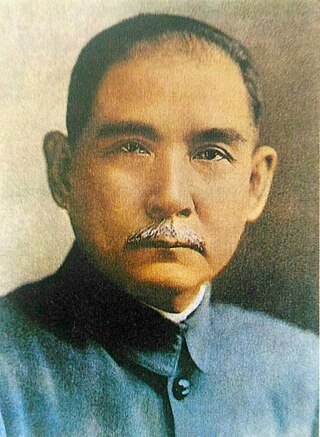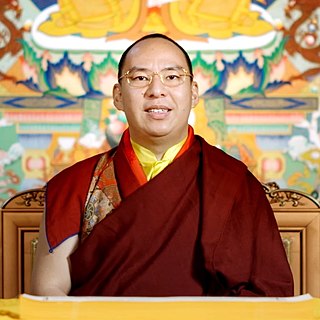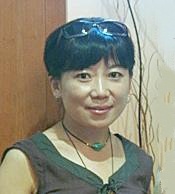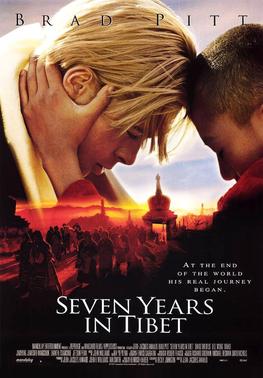Related Research Articles

Tibet is a region in the central part of East Asia, covering much of the Tibetan Plateau and spanning about 2,500,000 km2 (970,000 sq mi). It is the homeland of the Tibetan people. Also resident on the plateau are some other ethnic groups such as the Monpa, Tamang, Qiang, Sherpa and Lhoba peoples and, since the 20th century, considerable numbers of Han Chinese and Hui settlers. Since the annexation of Tibet by the People's Republic of China in 1951, the entire plateau has been under the administration of the People's Republic of China. Tibet is divided administratively into the Tibet Autonomous Region, and parts of the Qinghai and Sichuan provinces. Tibet is also constitutionally claimed by the Republic of China as the Tibet Area since 1912.

The Central Tibetan Administration is a non-profit political organization based in Dharamshala, India. Its organization is modeled after an elective parliamentary government, composed of a judiciary branch, a legislative branch, and an executive branch, and is sometimes labelled as a government in exile for Tibet.

The Three Principles of the People is a political philosophy developed by Sun Yat-sen as part of a philosophy to improve China made during the Republican Era. The three principles are often translated into and summarized as nationalism, democracy, and the livelihood of the people. This philosophy has been claimed as the cornerstone of the nation's policy as carried by the Kuomintang; the principles also appear in the first line of the national anthem of Taiwan.

Vikram Seth is an Indian novelist and poet. He has written several novels and poetry books. He has won several awards such as Padma Shri, Sahitya Academy Award, Pravasi Bharatiya Samman, WH Smith Literary Award and Crossword Book Award. Seth's collections of poetry such as Mappings and Beastly Tales are notable contributions to the Indian English language poetry canon.

The Panchen Lama is a tulku of the Gelug school of Tibetan Buddhism. The Panchen Lama is one of the most important figures in the Gelug tradition, with its spiritual authority second only to the Dalai Lama. Along with the council of high lamas, he is in charge of seeking out the next Dalai Lama. Panchen is a portmanteau of Pandita and Chenpo, meaning "great scholar".

Chökyi Gyalpo, also referred to by his secular name Gyaincain Norbu or Gyaltsen Norbu, is considered the 11th Panchen Lama by the government of the People's Republic of China (PRC). He is also the vice president of the Buddhist Association of China. Gyalpo is considered by some to be a proxy of the Chinese government.

Losar also known as Tibetan New Year, is a festival in Tibetan Buddhism. The holiday is celebrated on various dates depending on location tradition. The holiday is a new year's festival, celebrated on the first day of the lunisolar Tibetan calendar, which corresponds to a date in February or March in the Gregorian calendar. In 2020, the new year commenced on the 24th of February and celebrations ran until the 26th of the same month. It also commenced the Year of the Male Iron Rat.
The Tibetan calendar, or Tibetan lunar calendar, is a lunisolar calendar, that is, the Tibetan year is composed of either 12 or 13 lunar months, each beginning and ending with a new moon. A thirteenth month is added every two or three years, so that an average Tibetan year is equal to the solar year.
Tibet is a region in East Asia covering much of the Tibetan Plateau that is administered by People's Republic of China as the Tibet Autonomous Region and claimed by the Republic of China as the Tibet Area and the Central Tibetan Administration. The CTA uses the snow lion flag of the independent Tibetan state from 1912 to 1951. The snow lion flag has become a pro-independence symbol and is outlawed in the People's Republic of China after the 1959 Tibetan uprising. The PRC uses its national flag instead to represent Tibet.

Colin Gerald Dryden Thubron, FRAS is a British travel writer and novelist. In 2008, The Times ranked him among the 50 greatest postwar British writers. He is a contributor to The New York Review of Books, The Times, The Times Literary Supplement and The New York Times. His books have been translated into more than twenty languages. Thubron was appointed a CBE in the 2007 New Year Honours. He is a Fellow and, between 2009 and 2017, was President of the Royal Society of Literature.

Neil Forbes Davidson, Baron Davidson of Glen Clova is a Scottish lawyer and former Advocate General for Scotland.

Nicholas Crane is an English geographer, explorer, writer and broadcaster. Since 2004 he has written and presented four television series for BBC Two: Coast, Great British Journeys, Map Man and Town.

Tsering Woeser is a Tibetan writer, activist, blogger, poet and essayist.

Seven Years in Tibet is a 1997 American biographical war drama film directed by Jean-Jacques Annaud. It is based on Austrian mountaineer and Schutzstaffel (SS) sergeant Heinrich Harrer's 1952 memoir Seven Years in Tibet, about his experiences in Tibet between 1944 and 1951. Seven Years in Tibet stars Brad Pitt and David Thewlis, and has music composed by John Williams with a feature performance by cellist Yo-Yo Ma.

The Xinhai Lhasa turmoil was an ethnic clash in Lhasa, Tibet, as well as a series of mutinies following the Wuchang Uprising. It effectively resulted in the end of Qing rule in Tibet.
Melvyn C. Goldstein is an American social anthropologist and Tibet scholar. He is a professor of anthropology at Case Western Reserve University and a member of the National Academy of Sciences.
The 1987–1989 Tibetan unrest was a series of protests and demonstrations that called for Tibetan independence. These protests took place between September 1987 and March 1989 in the Tibet Autonomous Region, in the Tibetan regions of Sichuan, and Qinghai, as well as the Tibetan prefectures in Yunnan and Gansu. Protests began shortly after the Dalai Lama, the religious and temporal leader of Tibet exiled in India since the 1959 Tibetan unrest, proposed a Five Point Peace Plan regarding the “status of Tibet” on September 21, 1987, which was subsequently rejected by the Chinese government. The Plan advocated for greater respect and autonomy of the Tibetan people, and claimed that “Tibet was a fully independent state when the People’s Liberation Army invaded the country in 1949-50.” China rejected the idea of Tibetans as an invaded people, stating that “Tibet is an inalienable part of Chinese territory” and has been for hundreds of years. The Tibetan sovereignty debate is longstanding, and the Tibetan assertion that they are a separate and unique people invaded by China has become a central argument for their independence.

Tibet was a de facto independent state in East Asia that lasted from the collapse of the Manchu-led Qing dynasty in 1912 until its annexation by the People's Republic of China in 1951.

Barry Victor Sautman is a professor emeritus with the Division of Social Science at the Hong Kong University of Science and Technology. He holds both Canadian and American nationalities and he speaks both English and Cantonese.
Hsiao-ting Lin is a Taiwanese research fellow at the Hoover Institution who studies Greater China, including ethnopolitics, the Kuomintang, and Taiwan–United States relations during the Cold War.
References
- Book review of A Year In Tibet
- Tibet: Transformation and tradition about the BBC series A Year In Tibet.
- Another review of the BBC series